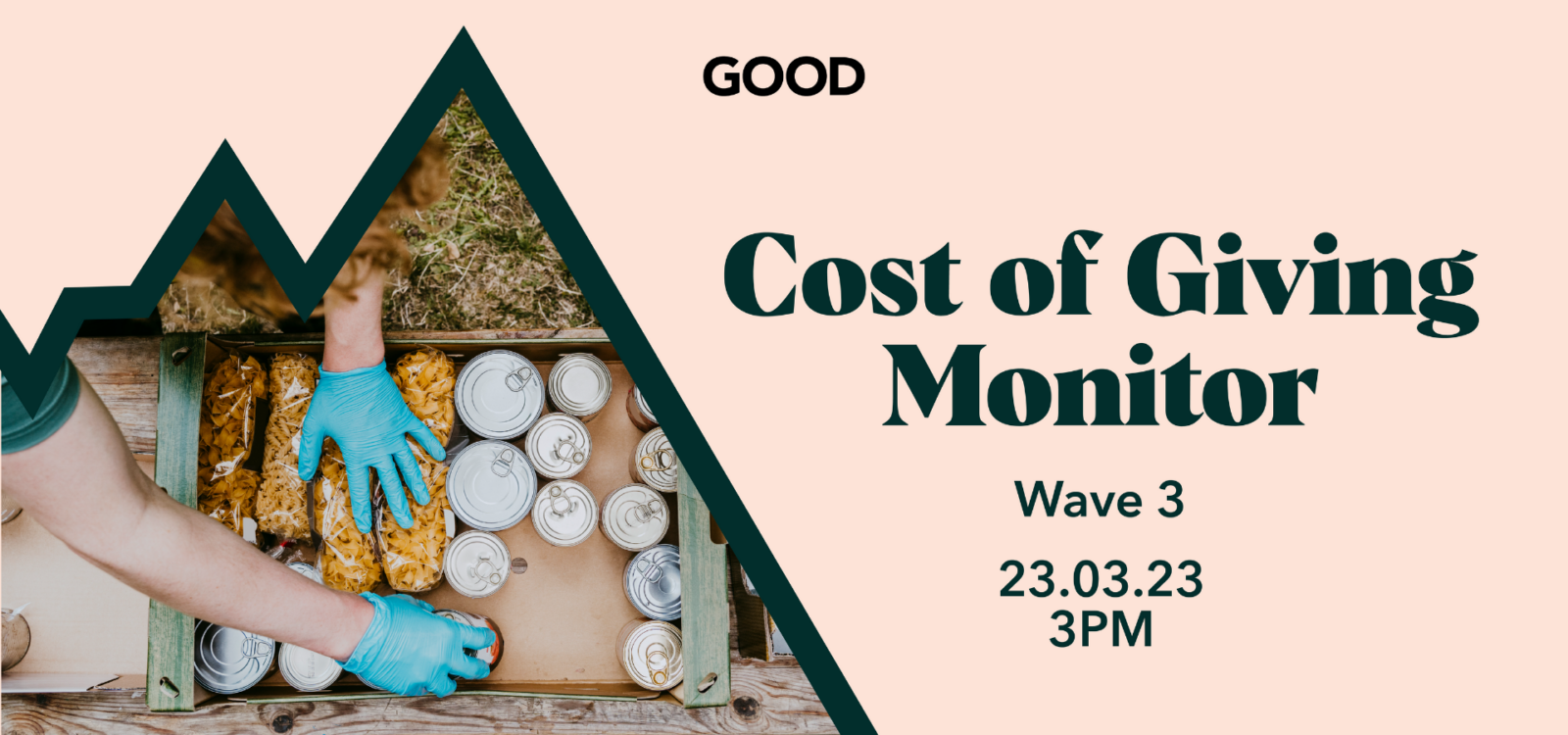
Cost of Giving Monitor: Wave 3
Britons believe charities need to do more; only 33% agree that charities are doing an effective job of supporting people in the cost of living crisis.
The Cost of Giving Monitor was first inspired by a Charity CEO Roundtable, hosted by GOOD, which revealed a pressing need for insight and data on the cost of living crisis and its impact on individual giving in the UK.
Nine months on, with the first and second waves providing fresh insight for charity leaders to guide them through the crisis, the final wave concludes the longitudinal research report. For Wave 3, we have included qualitative research with five Senior Fundraisers, to better understand how the crisis is impacting their organisations.
We partnered with YouGov for the third and final wave of the “Cost of Giving Monitor.” The latest report provides an update on key data and fresh insight for charity fundraisers, as well as reflects on the changes to giving over the past 9 months.
Headlines:
-Poverty in Britain is losing urgency in the UK’s psyche, with a -11% decline in people reporting poverty as the most urgent cause to support.
-Over half the population (51%) have witnessed charities talking about the impact of the cost of living crisis, however, just 33% agree that they are doing an effective job in supporting people.
-An increasing number of existing regular givers are considering cancelling their regular gifts – the likelihood of cancellation has risen from 10% to 14% since July 2022. However, the number of those looking to set up a new regular gift has remained the same.
-The sentiment for giving is still strong. 61% of givers say they will keep their giving at the same level or more in the next three months.
As we move into Spring, the cost of living crisis is still having a monumental impact on day-to-day life in the UK – with 7 in 10 Britons disagreeing that the cost-of-living crisis is behind us now and that their finances are starting to improve. However, compared to Wave 1 and 2, there is a growing sense of stability among respondents. More individuals are reporting that their finances are expected to stay the same, with the number rising to 38% from 29% in October.
The cost of living crisis is still recognised as a social priority, with over 8 out of 10 (82%) agreeing that they expect the cost of living crisis to remain an urgent problem for all of 2023. However, there is a caveat to the urgency surrounding UK poverty. It is slowly losing priority due to the constantly evolving news agenda and people’s shifting perceptions. Since July, UK poverty has had a -11% decline in people reporting it as the most urgent cause to support. Alongside this, whilst many Britons have heard charities address the cost of living crisis (51% amongst the British public, 60% amongst regular givers), only 33% agree that charities are doing an effective job in supporting people. This challenge highlights the importance of not just mentioning the crisis but effectively communicating the impact of charity work in addressing it. Charities will benefit by effectively highlighting the significance, urgency and impact of donations.
Propensity to give from the UK public that give to charity has remained relatively unchanged. Most of those who donate regularly have indicated they will not change their giving habits, with 61% of givers stating they will keep giving at the same level. As with Wave 1 and 2, generational and demographic differences prevail. Older generations are more likely to maintain their current giving levels, whereas younger generations are less likely to donate. However – a higher percentage of younger individuals expressed interest in giving more in the future. Therefore charities need to look beyond the current crisis and not ignore the younger generations as potential new donors who may become more charitable in the future.
Looking ahead, the public’s outlook and mood is divided. There is a split between those who are feeling hopeful and those who are more pessimistic. However, hope prevails. Over 2 in 5 people (42%) selected “hopeful” when asked to choose the three words that best describe their feelings about the year ahead.
Chris Norman, CEO and Founder of GOOD Agency, says “The final wave of the Cost of Giving Monitor reveals that the UK public is starting to show signs of adjusting to the cost-of-living crisis. Worryingly it looks like the decline in the number of regular donors seen in the years before the pandemic will continue. Reframing charity’s “ask” to demonstrate the value of the donors’ support and the charity’s impact is going to be key to retain donors and engage new supporters. This research provides important insights to enable charities to plan and adapt for the future.”


